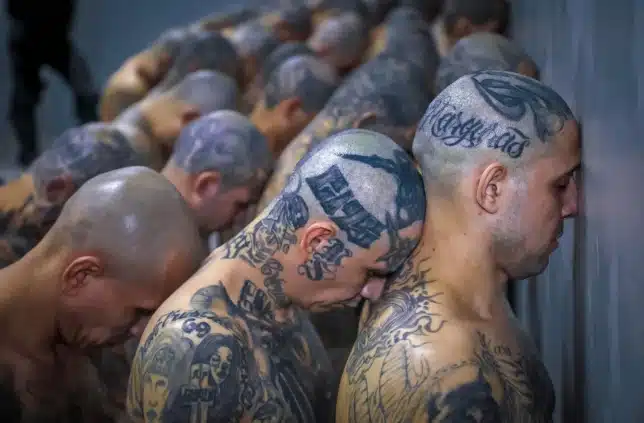Since El Salvador imprisoned tens of thousands of people earlier this year as part of a campaign against street gangs, at least 153 detainees have been tortured and died there.
The country’s “war on gangs” has resulted in dozens of people dying in state custody after being detained without being given a chance to defend themselves, according to a report by the human rights organisation Cristosal.
According to the report, four women were among those killed, and the vast majority of deaths were the consequence of torture, as well as repeated and significant injuries.
The bodies of nearly half of the victims showed symptoms of asphyxiation, fractures, and lacerations. Nearly half of the victims died violent deaths.
Others showed signs of malnutrition and deliberate denial of food, medicine and medical assistance.
None of the people who died in prison had not been officially convicted of the crime they were accused of committing at the time of their arrest.
The deaths revealed punitive policies carried out by guards and prison officials. The report stated that such actions would have required authorization and backing by the highest level security officials.
El Salvador opened a mega-prison earlier this year to house some 40,000 suspected gang members, after the government granted itself emergency powers in March 2022 to tackle the country’s powerful street gangs.
The high-tech prison, designed specifically to house gang members, is the largest of its kind in the Americas, and the security minister for the Central American country warned inmates they ‘will never walk out of here’.
Following its opening, El Savador’s president Nayib Bukele tweeted that ‘at dawn, in a single operation, we transferred the first 2,000 members to the Center for the Confinement of Terrorism (CECOT)’.
He added: ‘This will be their new house, where they will live for decades, all mixed, unable to do any further harm to the population.’
Officially, the government has arrested more than 68,000 people under the new powers, although the actual number is thought to be even higher.
More than 5,000 people have been freed because they could not convince a judge they were tied to criminal structures, according to authorities.
Cristosal said it compiled the information through field work, including at common graves, and collecting documents from medical examiners. Investigators also interviewed victims’ families and neighbours, as well as others who were jailed and later released.
The organisation called on the administration of President Nayib Bukele to answer about the conditions people are held under, respect due process, free the innocent, answer for those who have died, provide all available information to victims’ families and end the measures implemented under the special powers.
Other human rights groups and foreign governments have condemned the government’s actions and called for a lifting of what were supposed to be temporary measures.
Bukele, however, maintains high levels of approval within El Salvador for his actions against the gangs.
The rights group’s report comes as a judge sentenced former El Salvador President Mauricio Funes to 14 years in prison on Monday for allegedly negotiating with gangs during his administration.
Funes’ trial began in April with the former leader living in Nicaragua. El Salvador changed its laws last year to allow trials in absentia.
Prosecutors had accused Funes of illicit association and failure to perform his duties for the gang truce negotiated in 2012. Funes had denied negotiating with the gangs or giving their leaders any privileges.
Funes’ former Security Minister Gen. David Munguía Payes was also sentenced to 18 years in prison for his involvement in the negotiations.
The former president, who governed from 2009 to 2014 and lives in Nicaragua, was granted Nicaraguan citizenship in 2019. The Nicaraguan constitution holds that no citizen may be extradited.

